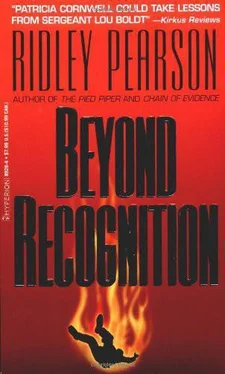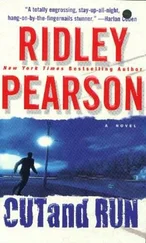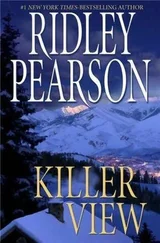Ridley Pearson - Beyond Recognition
Здесь есть возможность читать онлайн «Ridley Pearson - Beyond Recognition» весь текст электронной книги совершенно бесплатно (целиком полную версию без сокращений). В некоторых случаях можно слушать аудио, скачать через торрент в формате fb2 и присутствует краткое содержание. Жанр: Триллер, на английском языке. Описание произведения, (предисловие) а так же отзывы посетителей доступны на портале библиотеки ЛибКат.
- Название:Beyond Recognition
- Автор:
- Жанр:
- Год:неизвестен
- ISBN:нет данных
- Рейтинг книги:5 / 5. Голосов: 1
-
Избранное:Добавить в избранное
- Отзывы:
-
Ваша оценка:
- 100
- 1
- 2
- 3
- 4
- 5
Beyond Recognition: краткое содержание, описание и аннотация
Предлагаем к чтению аннотацию, описание, краткое содержание или предисловие (зависит от того, что написал сам автор книги «Beyond Recognition»). Если вы не нашли необходимую информацию о книге — напишите в комментариях, мы постараемся отыскать её.
Beyond Recognition — читать онлайн бесплатно полную книгу (весь текст) целиком
Ниже представлен текст книги, разбитый по страницам. Система сохранения места последней прочитанной страницы, позволяет с удобством читать онлайн бесплатно книгу «Beyond Recognition», без необходимости каждый раз заново искать на чём Вы остановились. Поставьте закладку, и сможете в любой момент перейти на страницу, на которой закончили чтение.
Интервал:
Закладка:
Harriet Magpeace kept her graying hair short over her ears. She had Irish coloring and a long elegant neck, around which she had fastened a string of pearls. She was dressed in gabardine slacks and a black cotton sweater, nice but not showy. Her daughter, who had inherited her mother’s Irish green eyes, was wonderful to look at. She wore a modest gray suit, appropriate for her job in a downtown advertising firm. If Dorothy had looked anything like her sister, she had been a beauty.
The mother removed a small group of photos from a Coach purse and slid them disdainfully across the linen toward Boldt, as if not wanting to see them herself. “I’m sorry I couldn’t meet you at the police station or my home,” she apologized, glancing around. “This is better.” She did not look comfortable.
“We do want to thank Detective Matthews for telling us about the arson before the press got hold of it,” the daughter said meekly. Matthews was not a detective; she was the departmental psychologist, a lieutenant, but Boldt did not correct the woman.
“Obviously it’s a shock,” the mother said. She tensed, and Boldt worried that she wouldn’t hold up.
A violent death was more than a shock; he understood this well. It was an invasive event that pried open the victim’s life in a sterile, analytical way that was like shining too much light onto a face or into a room. It bared all. It left the victim defenseless to explain the hidden bottles of vodka, the nude videos, the love letters, the stash of crisp hundred-dollar bills. It rolled the rock off the dark places of a private life. He hated to do this to Dorothy Enwright.
Boldt explained, “This is a lousy job at times. This is one of those times. I have to ask questions that imply I don’t trust the quality of Dorothy’s character. I want you to know right off that that is not the case. I would love to approach this a different way, but I’m afraid the truth is often more elusive than any of us would believe. What my experience has taught me is that none of us want to be here, and that by getting to the point we get it over more quickly, which is what we all want. Again, I do this only for the sake of getting to the truth, not because I’ve formed any advance opinions of Dorothy.”
“I think we understand,” the dark beauty said. Her mother nodded.
Boldt said, “If she was murdered”-at which point Harriet Magpeace twitched violently-“then we start first with looking at people close to her: a husband, a lover, a co-worker. Since the house may or may not be involved, itself a victim, we might want to look at repairmen, contractors, service providers. What I need from you is a snapshot of Dorothy’s life, including, but not limited to, the events that led up to the day of the fire.”
The older woman stared at Boldt sadly. “Yours is a morbid life, isn’t it, Sergeant?”
Boldt winced. He didn’t appreciate his work-his life-being reduced to such a statement, hated it all the more for the truth of it. Death was a way of life for him, it was true; but for Boldt it was seen as a means to an end, the only acceptable end being justice and the imprisonment of the party responsible. An investigator who relied upon the victim to tell the story-a man who even lectured on the subject-Boldt understood the intricacy of the relationship between victim and killer. That he exploited this relationship was nothing he tried to hide or make light of. That it often bordered on the grotesque was inescapable.
“I’m sure my mother means that sympathetically,” Claudia interjected, attempting to lessen the blow and come to her mother’s aid. “We certainly appreciate all you’re doing to find Doro’s killer-if that’s actually what happened. I have to tell you, the whole thing is a little fantastic. Arson? Murder? Doro? I mean, come on!”
Boldt was prepared for disbelief. He hesitated to tell them that no one-no one! — ever anticipated murder, except on television. Even the parents of known drug dealers were stunned with surprise to learn of their child’s death. Boldt said the few words he would rather have not said. “Can you tell me a little bit about Dorothy?”
The mother blinked rapidly. This was where business and the nature of that business collided. Claudia filled in quickly. “Doro was divorced two years ago. Bob’s an architect. Doro writes-wrote-for garden magazines and a few of the food magazines as well. She … it was Doro’s fault-the divorce.”
“It wasn’t her fault!” the mother snapped.
“She fell in love with another man, Mother. It certainly was her fault.” To Boldt, Claudia said, “The boyfriend died of cancer a few months after the separation; she lost him. It was awful. For everyone,” she added. “Dorothy lost the child in the divorce. She only got visitation rights. It was miserable.”
“ She was miserable,” corrected the mother.
“But there was no hostility on her part. She understood the judge’s ruling, as much as she hated it. We talked about it. It’s not like she threatened Bob or anything.”
“She was a lovely girl,” the mother mumbled.
“You spend all those years with someone,” the sister said, “and you just expect them to be around. And then they’re not. There are so many things I want to tell her.”
Boldt nodded. This, too, he had heard a hundred different times.
Claudia said, “I know what you’re looking for, Sergeant. At least I think I do. But I just don’t see it. Bob would never, ever, do such a thing. Not a chance.” She hesitated, studied Boldt, and then rattled off Bob Enwright’s office and home phone numbers, knowing Boldt would want to talk with him. She was right.
The sergeant asked, “Did she own the house?”
“A rental,” the sister replied. The mother looked lost. Claudia said, “You were thinking insurance, weren’t you? She burned it for the insurance and got caught in the fire? No chance.”
“We consider every possibility,” Boldt said.
The mother said, “Someone murder Dorothy? Why?”
“That’s why the sergeant’s here,” Claudia said perfunctorily.
“Don’t patronize me, dear. I’m your mother. I know perfectly well what we’re trying to do: to give someone a reason to kill Dorothy. It’s absurd, don’t you see?” she directed the question to Boldt.
“The child had last visited the mother-”
“The day before,” Harriet answered.
“Two days,” Claudia said in disagreement.
That also was to be expected, Boldt thought. Take down five eyewitness reports of the same crime and be prepared for five different stories-occasionally, completely different stories.
Claudia said firmly, “It was two days before. Remember dinner, Mother?”
The mother squinted, considered this, displayed an expression of self-disappointment. “Two, you’re right.”
“The father picked up the child?” Boldt asked.
“Not typically. I would doubt it.”
The mother said, “No. Dorothy dropped him off.”
Claudia explained, “Doro was the more flexible of the two.”
If given half a chance, if at all average, they would lie to get custody of the child; they would be eager to conspire against the former husband. Boldt had come prepared to see through this. When they failed to make any such attempt, Boldt felt somewhat disappointed. Could Dorothy Enwright have committed suicide? he wondered. Watching out for the sister, he said, “Dorothy was a gardener. Obviously a good one. One would assume she stored fertilizer, used various fertilizers in her work.”
“In the shed, not the basement.” Claudia added, “She wasn’t in the habit of making bombs, if that’s what you’re driving at. Whatever happened to ‘innocent until proven guilty’?”
“Making bombs?” the mother inquired.
Читать дальшеИнтервал:
Закладка:
Похожие книги на «Beyond Recognition»
Представляем Вашему вниманию похожие книги на «Beyond Recognition» списком для выбора. Мы отобрали схожую по названию и смыслу литературу в надежде предоставить читателям больше вариантов отыскать новые, интересные, ещё непрочитанные произведения.
Обсуждение, отзывы о книге «Beyond Recognition» и просто собственные мнения читателей. Оставьте ваши комментарии, напишите, что Вы думаете о произведении, его смысле или главных героях. Укажите что конкретно понравилось, а что нет, и почему Вы так считаете.












